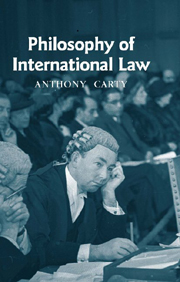Book contents
- Frontmatter
- Contents
- Preface and Acknowledgments
- 1 What Place for Doctrine in a Time of Fragmentation?
- 2 Continuing Uncertainty in the Mainstream
- 3 International Legal Personality
- 4 The Use of Force
- 5 American Legal Cultures of Collective Security
- 6 Marxism and International Law
- 7 Resistances to the Neoliberal International Economic Order
- 8 From an Order of Fear to One of Respect
- Index
1 - What Place for Doctrine in a Time of Fragmentation?
Published online by Cambridge University Press: 12 September 2012
- Frontmatter
- Contents
- Preface and Acknowledgments
- 1 What Place for Doctrine in a Time of Fragmentation?
- 2 Continuing Uncertainty in the Mainstream
- 3 International Legal Personality
- 4 The Use of Force
- 5 American Legal Cultures of Collective Security
- 6 Marxism and International Law
- 7 Resistances to the Neoliberal International Economic Order
- 8 From an Order of Fear to One of Respect
- Index
Summary
A Definition of Doctrine and its Present Problematic in Public International Law
I intend to begin simply by referring to two recent French works, the Dictionnaire encyclopédique de théorie et de sociologie du droit and a colloquium organized by the legal history department of the University of Picardie (Amiens), La Doctrine juridique. The first provides us with an authoritative and vital distinction between legal doctrine and legal dogmatics, while the second explains the problematic of keeping the former alive.
The French dictionary distinguishes doctrine from ‘dogmatique juridique’ (legal dogmatics). The former is defined as ‘opinion, theory or thesis,’ while the latter means the domain of the science of law concerned with the interpretation and systematization of juridical norms. An essential element of doctrine is that it is supposed to have authority. The theory, opinion, etc. must be capable of exercising influence. Coming from the tradition of Roman law and canon law, particularly in French and German legal communities, doctrine has authority not as a source of law as such, but as freely and spontaneously held opinion, which is likely to become accepted. Since the seventeenth century the nature of this authority has become contested. It is seen as rooted in theories of natural right which were increasingly regarded as the ideological apparatus of a dominant bourgeois class.
Legal dogmatics works within the assumptions of legal positivism, particularly with respect to the sources of law. It is concerned with the interpretation of statutes and jurisprudence.
- Type
- Chapter
- Information
- Philosophy of International Law , pp. 1 - 25Publisher: Edinburgh University PressPrint publication year: 2007



